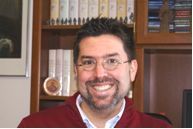
Also known as Simon ben Jonah, Simon Peter, and Cephas, Peter was the son of Jonah, the brother of Andrew, and a native of Bethsaida. Married, he and his wife lived in Capernaum. According to both Matthew and Mark, while fishing in Lake Gennesaret Peter and his brother were called by Christ to be His disciples.
All four gospels record that Jesus foretold that Peter would deny Him three times that same night. Before doing so, however, Peter cut off the ear of Malchus, a servant of the High Priest. After Jesus’ crucifixion, Peter was the first to enter the empty tomb.
According to the book of Acts, Peter was an extremely important figure within the early Christian community. He delivered a significant speech on the day of Pentecost, and was a leader in finding a replacement for Judas Iscariot. Peter was dragged before the Sanhedrin on two occasions, went on missionary trips to Lydda, Joppa, and Caesarea, and was instrumental in the decision of the council of Jerusalem to evangelize the Gentiles and accept them without circumcision.
Another early Christian document reports the tradition that Peter was fleeing Rome to avoid execution when he encountered a vision of Jesus. Peter asked Him, “Quo vadis?”, “Where are you going?”, to which Jesus replied that He was going to Rome to be crucified again. Peter returned to the city and accepted his martyrdom.
Early Christian authors such as Clement of Rome, Ignatius of Antioch, Dionysius of Corinth, and Irenaeus of Lyon all say that Peter was crucified, upside down, as part of the Christian persecution meted out by Emperor Nero in response to the great fire of Rome. Some scholars suggest that it was on October 13, 64.

